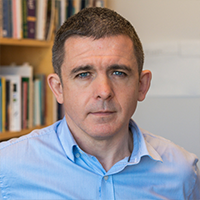About
- David Hughes created PlantVillage, an initiative to empower farmers with agricultural knowledge and technologies, including smartphone apps that diagnose plant diseases, monitor weather and track insect outbreaks — all with an eye toward predicting crop yields and reducing global food insecurity.
- During the recent locust outbreaks in Africa and Asia, Hughes worked with the United Nations Food and Agriculture Organization to deploy a mobile app to locate and track insect swarms and assist in early warning and targeted spraying efforts.
David Hughes is the Dorothy Foehr Huck and J. Lloyd Huck Chair in Global Food Security. His research focuses on developing diverse approaches to studying agricultural diseases, pests and weeds. He uses artificial intelligence, cloud computing and satellites to create tools to enable farmers to adapt to climate change and to reduce global food insecurity.
On the Web
In The Media
Gigantic new locust swarms hit East Africa
from National Geographic May 12, 2020
A mobile phone app called elocust3m was released in late February by David Hughes and his colleagues at Penn State University’s PlantVillage program, an open access public resource for smallholder farmers. Hughes developed the app at the request of the FAO, whose field staff have operated a similar tracking program on specialized tablets since 2014. The data are then shared with the government, which can decide how best to react.
After This Fungus Turns Ants Into Zombies, Their Bodies Explode
from New York Times October 24, 2019
In 2010, Dr. Hughes and his colleagues identified a 48-million-year-old fossil of a zombie ant with a death grip on a leaf. The fossil demonstrated that zombifying fungi have been around a long time. But it didn’t offer any hints as to how the fungus evolved from its ordinary ancestors.
The Hidden Science Behind 2020's Biggest Video Games
from Discover Magazine August 29, 2020
Penn State biologist David Hughes, who consulted on the first game, coauthored a 2017 study in which researchers found that Ophiocordyceps unilateralis doesn’t reach the brain at all — it just hijacks the rest of the ants' bodies, instead.
The developers really did a phenomenal job by themselves
from Inverse June 23, 2020
Why This Year's Locust Invasion Is Setting Off Global Panic
from VICE July 24, 2020
“We need to have lots of people reporting the presence or absence of locusts, because that gives us an accurate map,” says David Hughes, an entomologist who leads Penn State's PlantVillage platform, where local scouts can log coordinates for any locust sightings.
Extreme locust plague shown swarming Kenya in new video
from Mashable SE Asia February 23, 2020


